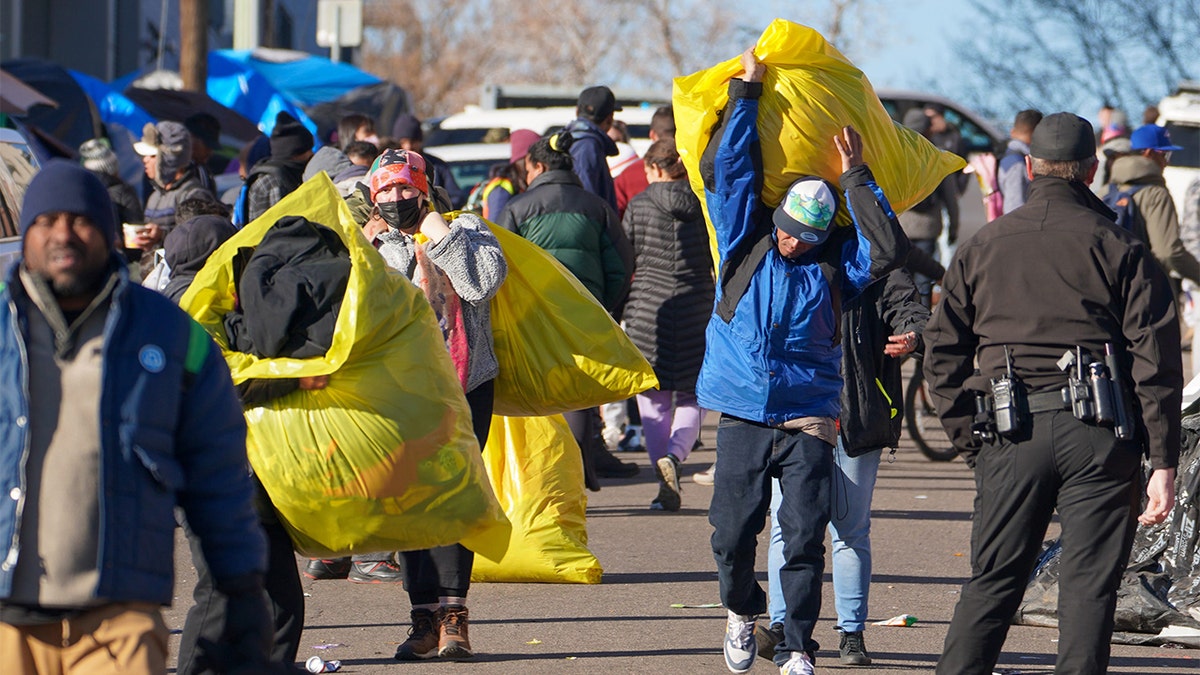Although Denver's suburbs don't share its sanctuary city policies, the influx of migrants into the Mile High City has spilled outward. Now, its neighbors are facing an unprecedented wave of activity from a notorious Venezuelan prison gang.
Officials from Aurora, about nine miles east of Denver, told Fox News Digital the Tren de Aragua gang has gained a strong foothold in their city, commandeering apartment complexes and drumming up violent crime and sex trafficking.
"We currently have entire complexes under gang control — complexes where staff have been beaten up, they've been threatened, their families have been threatened [and] complexes where there are no staff left on the property," Aurora City Council Member Danielle Jurinsky said. "These complexes are being run by this Tren de Aragua gang.
"They start brokering apartments themselves when someone leaves out of fear or whatever. They go in and take pictures of the apartment themselves. Then, I've been told, within hours, a Venezuelan family moves in.

Migrants carrying their belongings walk through an illegal tent encampment as city officials close it down in Denver, Colo., Jan. 3, 2024. (Trevor Hughes, Trevor Hughes/USA Today Network)
"Parts of the city are absolutely under this gang control. The local media is downplaying this," she said. "I believe politics is being played with people's lives. ... Nothing is being done to help the American citizens that are being trapped under this gang's control."
Jurinsky told Fox News Digital calls for emergency services have been on the rise, especially in light of a strapped police department.
"The number of emails coming in to me for help from residents and business owners, the volume is much higher. The allegations being made [about gang activity] are types of crime that I've not heard of on a regular basis in our city," she said.
Suspected members of Tren de Aragua are accused of a series of high-profile crimes across the United States, including the murder of Georgia nursing student Laken Riley and the shooting of two NYPD officers during an arrest in June.
Its leaders recently gave the "green light" for its members nationwide to shoot members of law enforcement who attempt to interfere with their criminal activity – even in Denver.
Jhonardy Jose Pacheco-Chirino, a Tren de Aragua leader who goes by "Galleta," the Spanish word for "Cookie," was arrested after brutally beating a man at an Aurora apartment complex that the gang had taken over, according to the New York Post. He was arrested again in July in a shooting at the same complex that left two wounded, the outlet reported.
Pacheco-Chirino has reportedly been detained and released at least twice since crossing the southern border in 2022, Homeland Security sources told the Post.
Denver, a city with about 710,000 residents, leads the nation in migrant arrivals per capita, with more than 40,000 arriving from the southern border since 2022, according to The Colorado Sun.
The city has spent an estimated $68 million to provide them with aid, even cutting back on emergency services. Meanwhile, Jurinsky and other members of Aurora's city council passed a resolution 7-3, pledging not to provide any support or resources to migrants coming into their city.
"We will not be aiding into this migrant crisis," Jurinsky told Fox News' "America's Newsroom."
Douglas County Commissioner Abe Laydon said that when a Denver bill became law in 2017, codifying the city's resistance to work with federal immigration enforcement, followed by numerous other initiatives to help migrants and asylum seekers, the impending ripple effect on neighboring communities was obvious.
"Not too long ago, we saw this influx of 40,000 migrants [to Denver]," Laydon said. "Douglas County rang the bell and said, 'Look, from a common sense perspective, it's impossible that wouldn't have a huge impact on resources in the Denver metro area – and it did."
In an effort to curb growing rates of migrants, Laydon said his county passed an ordinance that outlaws unscheduled bus stops in the area and does not allow "buses from San Antonio to drop immigrants off."
But attempts to control the influx have been crippled by Colorado state law HB19-1124, passed in 2019, that prohibits municipalities from communicating directly with federal government immigration enforcement.
As a result, Douglas and five other Colorado counties have banded together to sue the state, arguing the law violates the U.S. Supremacy Clause, which bars states from violating federal law, and the Intergovernmental Relationships Provision of Colorado's constitution, which forbids laws that prevent local governments from cooperating/contracting with the federal government.

Aurora, which has a population of about 390,000, has become the Tren de Aragua gang's home base in Colorado, officials said. (Kevork Djansezian/Getty Image)
"Our local law enforcement would like the ability to communicate with local immigration officials," Laydon said. "We have been apprised that there has absolutely been an increase in property crimes, assault and trafficking, and it's specific issues with the cartels coming out of Venezuela."
Despite their inability to communicate with federal immigration authorities, an ICE detention center sits within the city of Aurora, and Jurinsky said it is "bursting at the seams."
"Every week, they're just opening the back door and just letting hundreds of them go," Jurinsky said.
Joe Gamaldi, national vice president of the Fraternal Order of Police, told Fox News Digital, "This is not a Denver problem or an Aurora problem. This is a nationwide problem."
"There are gangs from all over South America that are coming over here and getting a foothold in our country," he said Monday. "We have taught criminals that you can commit crimes without being held accountable, and everyone is surprised when that’s exactly what they do."
In Aurora, he said, there will need to be "a significant investment in their gang division to get these guys behind bars" to put a dent in the problem. However, the city is "going to need a criminal justice system that is going to charge these guys and deport them.
"The police officers out there are going to do their job. They’re going to catch these guys and put them in jail. The question is whether they’re going to stay in jail or get deported. Don’t cut them any sweetheart deals. This isn’t rocket science. When people are robbing people with guns, lock them up for 20, 25 years."
Chris Swecker, the former head of the FBI's criminal investigation division, said this influx of gang members was "predictable and preventable," calling it "Mariel Boatlift 2.0." Swecker was referring to a mass emigration of Cubans to the United States in 1980 and comparing it to the rise of Salvadoran gang MS-13.
"I would’ve surged along the border when this popped up and put agents up to interview every non-Mexican crossing that border. You would’ve had informants to boot," Swecker said of potential ways to combat the nationwide problem. "It’s a question of being creative enough and confident enough to allocate the problems.
"At this point, federal agencies should get involved," he added. "The bureau has to get involved with ATF and DEA, share their intelligence and approach this as an international crime problem."
No comments:
Post a Comment
Note: Only a member of this blog may post a comment.